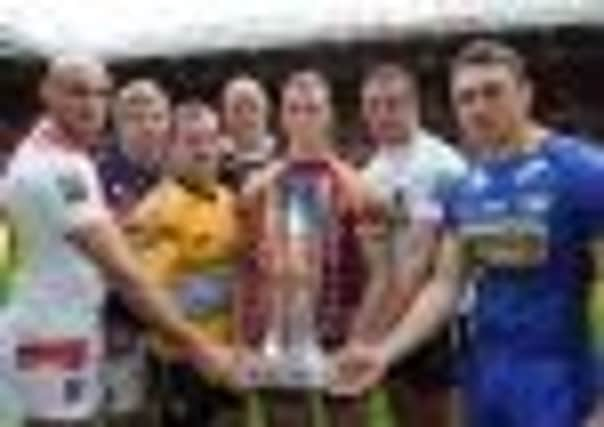RFL chief Lewis adamant that licensing still best way forward


Speaking at the Old Trafford launch of the new Engage Super League season yesterday, Lewis remained adamant that the process remains the way forward for the sport.
Both Wakefield Trinity Wildcats and the Crusaders have entered administration ahead of the weekend’s kick-off in Cardiff, the sort of financial strife which the three-year licence system was supposed to help prevent when introduced in 2008.
Lewis told the Yorkshire Post: “It’s not alarming.
“It’s a sign of the economic times in which we live.
Advertisement
Hide AdAdvertisement
Hide Ad“I think in all industries businesses are finding it tough. There are specific individual circumstances at both clubs that led to both having financial problems but I think both clubs will be stronger when they come out of administration.
“Neither of them went bust like clubs used to do trying to chase the dream of promotion or avoid the threat of relegation.
“I mean Wakefield’s situation has happened despite licensing. Crusaders was something that happened because of the wider economy and the legacy that was held over from South Wales.
“I don’t think either of those particularly attack the concept of licensing.
Advertisement
Hide AdAdvertisement
Hide Ad“Quite the reverse; licensing and the salary cap are two things the sport are very proud of.
“You put those two things together and you can say we’ve done our best to avoid clubs getting into financial trouble and it’s happened despite that.
“Personally, my view is that the reasons for licensing are very sound and I think it is even more readily accepted and widely accepted now than it was a few years ago.
“Anything new always has its critics but the way the sport has grown and flourished under licensing is an indication you would think it would continue.”
Advertisement
Hide AdAdvertisement
Hide AdMuch of the emphasis of the new Super League season will be placed on the month of July when 13 clubs will be told they have earned a licence for 2012-14 with one current club missing out.
A Championship outfit will be awarded a licence at the end of March.
Some people believe the licences should cover only two years to allow Championship clubs a more regular chance of entering Super League.
However, Lewis added: “What we did last time around was, after making the decision, talked to the clubs as in the end it is their decision.
Advertisement
Hide AdAdvertisement
Hide Ad“We asked what period was right and they thought another three years. Once we’ve made a decision this time and got that locked away for 2012 we’ll talk to the clubs about how the process has gone and any learning points.
“I’m sure one of the discussions will be the period of the next licences beyond the next three years. I don’t think it will be less than three years.”
Meanwhile, Lewis warned the BBC they are not guaranteed to win broadcasting rights for the Challenge Cup given a major new challenger.
“I think the BBC must know that there’s more intense competition for rights than ever before,” he said.
Advertisement
Hide AdAdvertisement
Hide Ad“The Challenge Cup offers fantastic value and is a very prestigious competition.”
ESPN are looking to invest and Sky could also face a fight for its broadcasting rights of Super League, with ESPN tipped to make a bid to televise the competition from 2012.
The existing deals for both the League and the Challenge Cup, with Sky and the BBC respectively, expire at the end of this season and the process of renewal has begun.
“We put the tender document out to prospective bidders last week and the broadcasters have a month to respond,” said Lewis. “I would think it will be at least a couple of months before we know what’s happening.
Advertisement
Hide AdAdvertisement
Hide Ad“We’ve had discussions with our long-standing partners like Sky and the BBC and we’ve had various conversations with new entrants like ESPN, who are interested. They already show rugby union and it’s logical for them to take a look at rugby league.
“There’s a lot of interest and I think it’s quite a buoyant marketplace for rugby league. I’m really encouraged.”
Lewis has not ruled out a departure from the exclusive deals which both Sky and the BBC have enjoyed in the past and says the League are open to negotiating packages incorporating primary and secondary rights.
The Challenge Cup final is currently one of the Government’s ‘listed’ events, the sporting competitions tied to free-to-air terrestrial television, but there is nothing to stop other broadcasters showing matches from the earlier rounds.
Advertisement
Hide AdAdvertisement
Hide AdThe RFL secured a significant increase when the Super League television rights were last renegotiated in November 2007, with each club’s annual share of the pot increasing from around £750,000 to more than £1m.